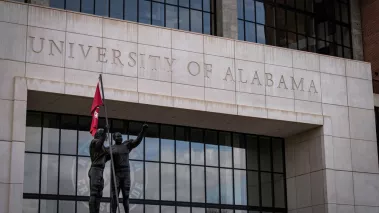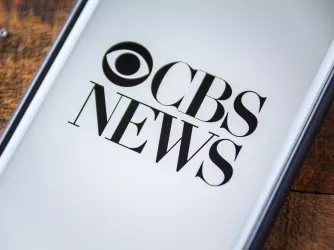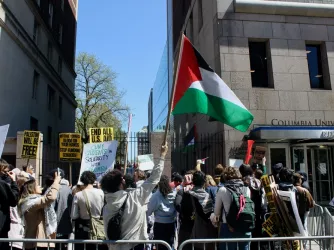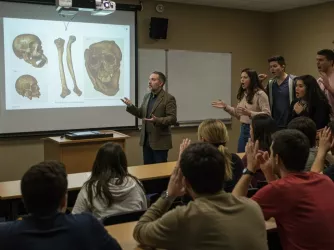Table of Contents
University of Alabama cites ‘core values’ in investigating #YeIsRight chalk

University of College / Shutterstock.com
The University of Alabama announced an investigation into chalk drawn on its sidewalks reading “#YeIsRight” and “America First,” citing the university’s “core values” as justification to remove the chalk and investigate the messages. FIRE wrote UA today to explain that it has almost certainly chilled students’ expression by citing the content of the messages in removing the chalk and announcing the investigation.
The messages were reportedly part of an announcement that two activists, Dalton Clodfelter and Tyler Russell, were coming to campus on Jan. 27. The two activists recently tabled at Florida Atlantic University with a sign reading “#YeIsRight Change My Mind,” leading to a pro-Israel demonstration on campus.
While UA’s Grounds Use Policies related to chalking prohibit chalk in the location the messages appear to have been drawn, UA did not mention these policies when justifying the investigation. Instead, the university cited its “Capstone Creed, [its] campus culture and [its] core values.”
At public universities, administrators cannot use government power to censor controversial views.
As a public university, UA is bound by the First Amendment to respect students’ expressive rights, which include the right to voice — or chalk — controversial, even hateful, viewpoints. UA may criticize the messages and even remove the chalk for violating viewpoint-neutral time, place, and manner restrictions, like those in its Grounds Use Policies. However, UA cannot ban speech solely because it offends some, many, or even most people on campus.
As we explained to UA, “[w]hether speech is protected by the First Amendment is ‘a legal, not moral, analysis,’” and its actions here are likely unconstitutional:
UA’s statement implies it can and will investigate and/or punish messages deemed to violate UA’s “core values.” As to the former, the harm caused by investigations alone is not de minimis—investigations into protected expression frequently constitute implicit threat of discipline, and the resulting chilling effect can constitute cognizable First Amendment harm. The implication that students could be investigated for similar messages would very likely “chill or silence a person of ordinary firmness from future First Amendment activities.” If UA can investigate chalking that “#YeIsRight” could it investigate a student for tweeting the same message or saying it in class?
At public universities, administrators cannot use government power to censor controversial views. Students with unpopular or controversial views will reasonably interpret UA’s investigation of the chalk messages as a warning that they, too, will be punished for similar speech.
Students who find these messages offensive can, and should, speak out and express their own opinions. If they see Clodfelter or Russell, they should feel free to engage with them and explain why they disagree. They can’t, however, resort to violence or substantial disruption to shut down views they disagree with. That conduct is not protected by the First Amendment and schools have a responsibility to stop it to secure others' expressive rights. Otherwise, they risk ratifying an unconstitutional heckler's veto.
We asked UA to confirm it will not investigate or punish similar subjectively offensive — but protected — expression in the future. We look forward to UA’s response and hope it will confirm it respects its students’ First Amendment rights.
FIRE defends the rights of students and faculty members — no matter their views — at public and private universities and colleges in the United States. If you are a student or a faculty member facing investigation or punishment for your speech, submit your case to FIRE today. If you’re a faculty member at a public college or university, call the Faculty Legal Defense Fund 24-hour hotline at 254-500-FLDF (3533). If you’re a college journalist facing censorship or a media law question, call the Student Press Freedom Initiative 24-hour hotline at 717-734-SPFI (7734).
Recent Articles
FIRE’s award-winning Newsdesk covers the free speech news you need to stay informed.

The FCC's show trial against CBS is a political power play

UPDATE: Another federal appeals court backs academic free speech for public employees

Feds to Columbia: ‘You want $400 million in contracts back? Do this (or else)’


